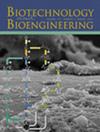Combinatorial Metabolic Engineering for Enhanced Gibberellic Acid Biosynthesis in Fusarium fujikuroi.
IF 3.5
2区 生物学
Q2 BIOTECHNOLOGY & APPLIED MICROBIOLOGY
引用次数: 0
Abstract
Gibberellic acid (GA3), a quintessential diterpenoid phytohormone, is indispensable in agronomic practices, horticulture, and the wine industry. This study implemented a combinatorial metabolic engineering strategy within Fusarium fujikuroi (F. fujikuroi) by integrating the potentiation of global regulatory factors (GRFs), and amplification of biosynthetic precursors, alongside dynamic modulation of cofactors with dissolved oxygen supply, to precisely enhance GA3 biosynthesis. Transcriptomic analyses revealed that positive GRFs (AreB, Hat1, and Ada3) enhanced carbon and nitrogen metabolism, increased biomass accumulation, and upregulated transcription levels of the GA3 biosynthetic gene cluster. The use of endogenous nitrogen-responsive promoters ensured a balanced supply of cofactors and oxygen, thereby preventing the accumulation of terpenoid by-products. These combinatorial metabolic engineering strategies presented in this study make a significant step toward the enhancement of GA3 yield (3.22 g/L) via submerged fermentation of F. fujikuroi, offering novel insights to enable high-level biosynthesis of secondary metabolites in fungal chassis.加强藤黑镰刀菌赤霉素酸生物合成的组合代谢工程。
赤霉素酸(GA3)是一种典型的二萜类植物激素,在农艺实践、园艺和葡萄酒工业中是不可或缺的。本研究在Fusarium fujikuroi (F. fujikuroi)中实施了一种组合代谢工程策略,通过整合全球调节因子(GRFs)的增强和生物合成前体的扩增,以及辅助因子与溶解氧供应的动态调节,精确地增强GA3的生物合成。转录组学分析显示,阳性GRFs (AreB、Hat1和Ada3)增强了碳氮代谢,增加了生物量积累,上调了GA3生物合成基因簇的转录水平。内源性氮响应启动子的使用确保了辅因子和氧气的平衡供应,从而防止了萜类副产物的积累。本研究提出的这些组合代谢工程策略在通过F. fujikuroi深层发酵提高GA3产量(3.22 g/L)方面迈出了重要的一步,为在真菌底盘中实现高水平的次生代谢物生物合成提供了新的见解。
本文章由计算机程序翻译,如有差异,请以英文原文为准。
求助全文
约1分钟内获得全文
求助全文
来源期刊

Biotechnology and Bioengineering
工程技术-生物工程与应用微生物
CiteScore
7.90
自引率
5.30%
发文量
280
审稿时长
2.1 months
期刊介绍:
Biotechnology & Bioengineering publishes Perspectives, Articles, Reviews, Mini-Reviews, and Communications to the Editor that embrace all aspects of biotechnology. These include:
-Enzyme systems and their applications, including enzyme reactors, purification, and applied aspects of protein engineering
-Animal-cell biotechnology, including media development
-Applied aspects of cellular physiology, metabolism, and energetics
-Biocatalysis and applied enzymology, including enzyme reactors, protein engineering, and nanobiotechnology
-Biothermodynamics
-Biofuels, including biomass and renewable resource engineering
-Biomaterials, including delivery systems and materials for tissue engineering
-Bioprocess engineering, including kinetics and modeling of biological systems, transport phenomena in bioreactors, bioreactor design, monitoring, and control
-Biosensors and instrumentation
-Computational and systems biology, including bioinformatics and genomic/proteomic studies
-Environmental biotechnology, including biofilms, algal systems, and bioremediation
-Metabolic and cellular engineering
-Plant-cell biotechnology
-Spectroscopic and other analytical techniques for biotechnological applications
-Synthetic biology
-Tissue engineering, stem-cell bioengineering, regenerative medicine, gene therapy and delivery systems
The editors will consider papers for publication based on novelty, their immediate or future impact on biotechnological processes, and their contribution to the advancement of biochemical engineering science. Submission of papers dealing with routine aspects of bioprocessing, description of established equipment, and routine applications of established methodologies (e.g., control strategies, modeling, experimental methods) is discouraged. Theoretical papers will be judged based on the novelty of the approach and their potential impact, or on their novel capability to predict and elucidate experimental observations.
 求助内容:
求助内容: 应助结果提醒方式:
应助结果提醒方式:


